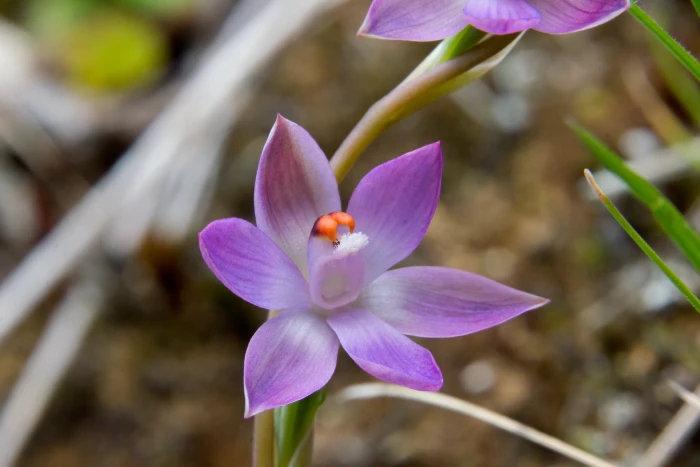Slender Sun Orchid
/
(Thelymitra pauciflora)
Slender Sun Orchid (Thelymitra pauciflora)
/

Hayden Jones
CC BY 4.0
Image By:
Hayden Jones
Recorded By:
Copyright:
CC BY 4.0
Copyright Notice:
Photo by: Hayden Jones | License Type: CC BY 4.0 | License URL: http://creativecommons.org/licenses/by/4.0/ | Rights Holder: Hayden Jones | Publisher: iNaturalist | Date Created: 2021-11-09T01:32Z |

























Summary
Thelymitra pauciflora, commonly known as the slender sun orchid in Australia and maikaika or maika in New Zealand, is a terrestrial, tuberous perennial herb. It is widespread in grasslands, open forests, and heathlands across southeastern Australia, including Tasmania, and is also found in New Zealand, extending to Chatham Island. This species typically grows up to 24 inches high when in flower and features a single erect, fleshy leaf. The slender sun orchid blooms with flowers that are 0.6 to 0.8 inches across. In New Zealand, the flowers exhibit dark blue, mauve, or magenta hues, while in Australia, they are generally pale blue, pink, or white. The flowers are known to open only in warm weather, with the flowering season spanning from August to January in Australia and from November to January in New Zealand.
The slender sun orchid is appreciated for its delicate and colorful flowers that add a unique charm to native plant gardens and naturalized areas. It is relatively low-maintenance, requiring well-drained soils and a position in full sun to part shade to thrive. While it is not commonly used in urban planting, it is an excellent choice for wildflower meadows and conservation projects. The plant’s ability to adapt to various light conditions and its drought tolerance once established make it a versatile addition to diverse garden settings. However, it is susceptible to root rot in poorly drained soils and may be difficult to cultivate outside its native range due to specific mycorrhizal associations required for growth.CC BY-SA 4.0
The slender sun orchid is appreciated for its delicate and colorful flowers that add a unique charm to native plant gardens and naturalized areas. It is relatively low-maintenance, requiring well-drained soils and a position in full sun to part shade to thrive. While it is not commonly used in urban planting, it is an excellent choice for wildflower meadows and conservation projects. The plant’s ability to adapt to various light conditions and its drought tolerance once established make it a versatile addition to diverse garden settings. However, it is susceptible to root rot in poorly drained soils and may be difficult to cultivate outside its native range due to specific mycorrhizal associations required for growth.CC BY-SA 4.0
Plant Description
- Plant Type: Herb
- Height: 0.6-1.5 feet
- Width: 0.5-1 feet
- Growth Rate: Moderate
- Flower Color: Blue, Pink
- Flowering Season: Spring, Summer
- Leaf Retention: Semi-deciduous
Growth Requirements
- Sun: Full Sun, Part Shade
- Drainage: Medium, Fast
Common Uses
Bird Garden, Butterfly Garden, Deer Resistant, Hummingbird Garden, Low Maintenance, Water Garden
Natural Habitat
Native to grasslands, open forests, and heathlands in southeastern Australia, including Tasmania, and also in New Zealand, extending to Chatham Island
Other Names
Common Names: Few-flowered Sun Orchid
Scientific Names: Thelymitra pauciflora
GBIF Accepted Name: Thelymitra pauciflora
